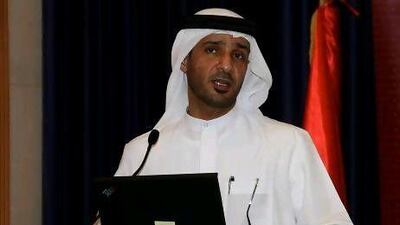AL AIN // Students have been urged to become more politically aware after a study found almost eight out of 10 were unable to name either of the deputy prime ministers and less than a quarter could name a single one of the FNC's 40 members.
The findings drew gasps from UAE University students and professors at a forum organised by the council to increase political awareness.
But they came as no surprise to Dr Saeed Al Ghafli, assistant undersecretary at the Ministry of State for FNC Affairs.
"In other countries they care about finding the right person because they are suffering in everyday life," he said. "But in the UAE, God gave us wise leadership. People are happy, so they do not care about politics."
Dr Al Ghafli, a member of the National Election Committee, said the ministry had conducted other studies that found widespread apathy about politics.
He said there could be many explanations for this, but chief among them was that people were "comfortable".
The study of 200 students at UAEU was conducted by Fatima Al Maamari, a senior studying political science. She said she could see no positive side to the results.
Ms Al Maamari accepted Dr Al Ghafli's explanation that people were "comfortable", "but to the point that you don't know who is responsible for this comfort? Then there is a problem," she said, drawing a round of applause from the audience.
Dr Al Ghafli and Ahmed Al Dhaheri, a former FNC member, said that because of political apathy electoral progress had to take place in stages, but progress was being made.
"Campaigns, elections, electoral college - a lot of other phrases not heard of before started to be heard in 2006 at the first elections," Dr Al Ghafli said.
The elections had encouraged Emiratis to contemplate social issues affecting the country, he said. Many candidates had discussed issues such as population structure, national identity, education, women's rights, children's rights, employment, Emiratisation, health and how to improve the quality of life.
He and Mr Al Dhaheri said they hoped all eligible Emiratis would be able to vote at the next FNC election.
One professor questioned why her niece, a first-year student at the university, was allowed to vote at the last election while she herself was not.
Dr Al Ghafli and Mr Al Dhaheri said the electoral college list was compiled as a representative sample of the Emirati population.
"The rulers' courts picked the people, the president left this to the rulers of the emirates," Dr Al Ghafli said. "And each put their own conditions to it, keeping in mind gender and age. All this was taken to consideration. I was working closely with them and know what happened."
Some students said they were still fearful of discussing politics and asked the panel for their opinion.
Dr Al Ghafli said this showed the need for more awareness, and Dr Al Dhaheri advised students to think of politics as administrative work.
"Let's think of it like that, to break this thinking," he said. "We are all politicians today."

